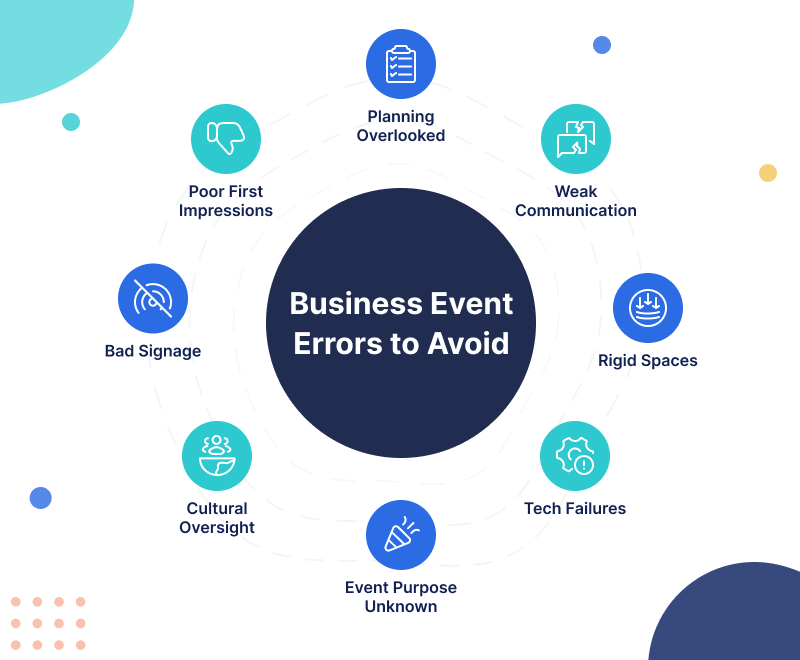Hosting a business event enables the hotelier to open the path to long-term client relationships with steady revenue.
Let’s explore the most common mistakes hotels make when hosting business events.
Underestimating the Planning Process
Planning a business Event is totally different from booking a birthday party or wedding, as it requires a deep understanding of corporate goals.

Poor Communication with Organizers
Communication plays a vital role in organizing any event; any sort of miscommunication can derail months of coordination.
Proper updates at every stage of event planning should be done proactively so that there are no surprises for the business event planner.
Lack of Flexible Meeting Spaces
The hotel needs to understand that all business events are different in terms of goal or space required; some may not fit into the banquet hall.
Hotels that don’t offer flexible layouts have a high risk of losing potential clients.
Technology That Fails at the Worst Time
Wi-Fi dropping during a keynote? Screens glitching during a pitch? These tech disasters can ruin the entire business event experience.
Using outdated or unreliable tech can make your venue look amateurish.
Not Knowing the Purpose of the Event
Business events are not just social anyway; they are also strategic. Hotels can focus too much on service and forget about the core business purpose.
Failing to understand the purpose of the event demonstrated a lack of professionalism.
Overlooking Dietary and Cultural Needs
Not all business guests eat the same things. Presuming a buffet works for all can anger, irritate, or inconvenience guests.
Hotels need to address dietary needs in advance. This is showing respect, care, and paying attention to corporate diversity.
Poor Signage and Wayfinding
Imagine showing up late to a panel because the signs did not get you there. It is frustrating and diminishes the quality of the hotel.
Hotels often forget that large business events need sharp navigation. Clear signs save time and reduce stress for all attendees.
Ignoring the Importance of First Impressions
Corporate guests notice details the moment they walk in. A cluttered front desk, dealing with staff who are unsure, or a delayed check-in affects everyone.
Hotels should prepare the front desk and concierge teams for an event. First impressions are usually long-lasting and can skew the entire experience with the hotel.
Not Providing On-Site Support
Even the best-planned functions can have a surprise or two. Hotels that lack an on-site coordinator leave guests helpless.
Dedicated event managers can solve last-minute issues quickly. Without them, your team may look disorganized or underprepared.
Inflexible Food and Beverage Timings
Executives run tight schedules—they won’t wait for delayed coffee. Rigid catering timelines can throw off an entire day’s flow.
Hotels should adapt to the event agenda, not the other way around. Being proactive about food service wins huge client appreciation.
Forgetting Sustainability Expectations
Today’s business events care deeply about sustainability. Hotels that still use plastic cutlery or waste food risk criticism.
Eco-conscious setups, water-saving systems, and waste reduction matter. Ignoring green trends can turn modern companies away from your venue.
Surcharging, hidden fees
When a client sees surprise fees after experiencing the event, they lose their trust in you as a vendor. Hotels sometimes add costs for AV, chairs, or extra Wi-Fi access.
Transparent pricing wins loyalty from corporate planners. Hidden fees will ensure they never return—or refer you again.
Failing to Collect and Act on Feedback
Many hotels don’t ask for post-event feedback. Or worse, they ask but do nothing about it.
Feedback is your best chance to grow and improve. It could also show potential clients that you care about their experience.
Not Preparing Your Staff For Business Etiquette
Having a more casual demeanor, especially during business events, becomes a reflection of your brand..
From banquet servers to security, everyone needs corporate etiquette.
Staff should be trained on dress code, tone, and professional conduct. A single rude interaction can ruin the entire business vibe.
Offering Generic, Forgettable Experiences
Business conferences don’t have to be dull. Hotels that offer new add-ons win in a saturated industry.
Consider branded welcome packets, networking lounges, or stress-reducing breaks. Little details leave lasting impressions.
Not Providing a Backup Plan For Weather or Power Problems
There is always a Plan B. Think two steps ahead for unpredictable circumstances – like bad weather, or power failure.
Sample: For outdoor corporate dinners or rooftop sessions, provide spaces under cover and have power backup plans.
Ignoring the Power of Post-Event Touchpoints
A business event is to build a path for a long-term relationship with clients.
A simple thank-you email or follow-up call goes a long way. It shows affection towards building relationships for future events.
Conclusion: Be the Venue They Brag About
Providing better services and space should not only be a goal for a hotelier; it’s about becoming a partner in your client’s success.
If you want to learn about the functionality of QloApps, then you can visit this link: QLO Reservation System.
Be the first to comment.